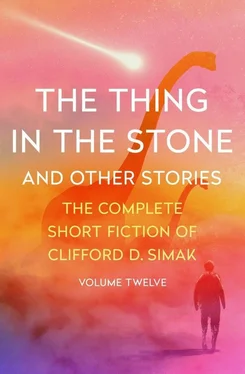“I will not die here,” said Lathrop, uneasily.
“We will …,” said one of them, repeating that word which told what they had done with Clay when he had died, and he said it almost as if it were a bribe to make the human want to stay and die.
“Perhaps he would not want us to,” said another one. “Clay wanted us to do it. He may not feel like Clay.”
There was horror in the burrow, a faint, flesh-creeping horror in the words they said and in the way they looked at him with anticipation.
The old gnome went to one corner of the burrow and came back with a bag. He set it down in front of Lathrop and tugged at the string which tied it, while all the others watched. And one could see that they watched with reverence and hope and that the opening of the bag was a great occasion—and that if there could be anything approaching solemnity in their squat bodies, they watched most solemnly.
The string finally came loose and the old gnome tilted the bag and grasped it by its bottom and emptied it upon the earthen floor. There were brushes and many tubes of paint, all but a few squeezed dry and a battered wallet and something else that the old gnome picked up from the floor and handed to the Earthman.
Lathrop stretched out his hand and took it and held it and looked at it and suddenly he knew what they had done to Clay, knew without question that great and final honor.
Laughter gurgled in his throat—not laughter at the humor of it, for there was no humor, but laughter at the twisted values, at the cross-purposes of concepts, at wondering how, and knowing how the gnomes might have arrived at the conclusion which they reached in rendering to Clay the great and final honor.
He could see it even now as it must have happened—how they worked for days carrying the earth to make the mound he’d seen beyond the village, knowing that the end was nearing for this alien friend of theirs; how they must have searched far for timber in this land of little bushes, and having found it, brought it in upon many bended backs, since they did not know the wheel; and how they fitted it together, fumblingly, perhaps, with wooden pegs and laboriously bored-out holes, for they had no metal and they knew no carpentry.
And they did it all for the love that they bore Clay, and all their labor and their time had been as nothing in the glory of this thing they did so lovingly.
He looked at the crucifix and now it seemed that he understood what had seemed so strange of Clay—the eternal searching, the mad, feverish wandering from one star system to another, even in part, the superb artistry that spoke so clearly of a hidden, half-guessed truth behind the many truths he’d spoken with his brush.
For Clay had been a survival-member of that strange, gentle sect out of Earth’s far antiquity; he had been one of those who, in this world of logic and of fact, had clung to the mysticism and the faith. Although for Clay, perhaps, the naked faith alone had not been enough, even as for him, Anson Lathrop, bare facts at times seemed not enough. And that he had never guessed this truth of Clay was easy to explain—one did not fling one’s faith into the gigantic snicker of a Logic universe.
For both of them, perhaps, neither fact nor faith could stand alone, but each must have some leavening of the other.
Although that is wrong, Lathrop told himself. I do not need the faith. I worked for years with logic and with fact and that is all one needs. If there is other need, it lies in another as-yet-undiscovered factor; we need not go back to faith.
Strip the faith and the mumbo-jumbo from the fact and you have something you can use. As Man long ago had stripped the disbelief and laughter from the poltergeist and had come up with the principle of polting, the fact and principle that moved a man from star to star as easily as in the ancient days he might walk down the street to his favorite bar.
Yet there could be no doubt that for Clay it had not worked that way, that with fact alone he could not have painted as he did, that it took the simple faith and the inner glow of that simple faith to give him the warmth and the dedication to make his paintings what they were.
And it had been the faith that had sent him on his search throughout the galaxy.
Lathrop looked at the painting and saw the simplicity and the dignity, the tenderness and the happiness and the sense of flooding light.
Exactly the kind of light, thought Lathrop, that had been so crudely drawn in the illustrations of those old books he had studied in his course on Earth’s comparative religions. There had been, he remembered, one instructor who’d spent some time on the symbolism of the light.
He dropped the crucifix and put out his hand and picked up some of the twisted tubes of oils.
The painting was unfinished, the gnome had said, because Clay had run out of paint, and there was truth in that, for the tubes were flattened and rolled up hard against the caps and one could see the imprint of the fingers that had applied the pressure to squeeze out the last drop of the precious oils.
He fled across the galaxy, thought Lathrop, and I tracked him down .
Even after he was dead I went on and tracked him down, sniffing along the cold trail he had left among the stars. And I tracked him because I loved him, not the man himself—for I did not know nor have any way to know what kind of man he was—but because I saw within his paintings something that all the critics missed. Something that called out to me. Deny it as I may, it may have been the ancient faith calling out to me. The faith that is missing now. The simple faith that long ago was killed by simple logic.
But he knew Clay now, Lathrop told himself. He knew him by the virtue of the tiny crucifix and by the symbol of the last great canvas and by the crude actuality of the mound that stood at the village end on this third rate planet.
And he knew why it had to be a third rate planet.
For there must be humility—even as in faith there had been humility, as there had never been in logic.
Lathrop could shut his eyes and see it—the somber clouds and the vast dreariness of the wastelands, the moors that swept on to foreverness, and the white figure on the cross and the crowd that stood beneath it, staring up at it, marked for all time by a thing they did not understand, a thing they could not understand, but a thing they had done out of utter kindness for one whose faith had touched them.
“Did he ever tell you,” he asked the gnomes, “where he had been? Where he came from? Where he had been just before he came here.”
They shook their heads at Lathrop. “He did not tell,” they said.
Somewhere, thought Lathrop, where the trees grew like those trees in the painting. Where there was peace and dignity and tenderness—and the light.
Man had stripped the husk of superstition from the poltergeist and had found a kernel in the polting principle. Man had done the same with anti-gravity, and with telepathy, and many other things but he had not tried to strip the husks from faith to find the hidden kernel. For faith did not submit to investigation. Faith stood sufficient to itself and did not admit of fact.
What was faith and what the goal of faith? In the many tongues of ancient Earth, what had been the goal of those who subscribed to faith? Happy hunting ground, valhalla, heaven, the islands of the blest—how much faith, how much could be fact? One would not know unless he lived by faith alone and no being now, or very few, lived entirely by their faith.
But might there not be, in the last great reckoning of galactic life and knowledge, another principle which would prove greater than either faith or fact—a principle as yet unknown, but only to be gained by aeons of intellectual evolution. Had Clay stumbled on that principle, a man who sought far ahead of time, who ran away from evolutionary knowledge and who, by that very virtue, would have grasped no more than a dim impression of the principle-to-come.
Читать дальше












